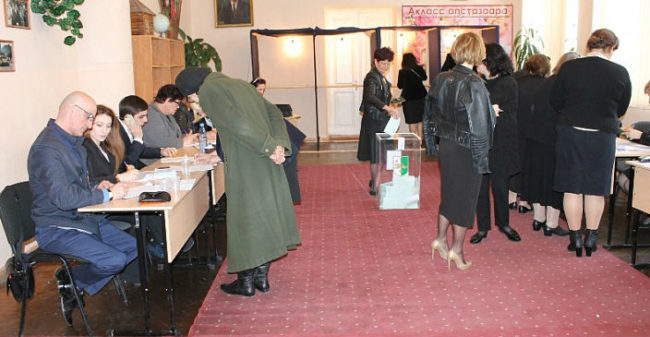

 According to preliminary results, 12 MPs were elected in the first round of parliamentary elections on 12 March in the de facto Republic of Abkhazia, with turnout of 56%. The remaining 22 MPs will be elected during the second round, the date of which will be announced in two weeks.
According to preliminary results, 12 MPs were elected in the first round of parliamentary elections on 12 March in the de facto Republic of Abkhazia, with turnout of 56%. The remaining 22 MPs will be elected during the second round, the date of which will be announced in two weeks.
The elections were held in 35 electoral districts with 133,000 people registered to vote. Of the 137 candidates, 113 ran as independents, while the others represented local political parties.
In order to win, candidate needed to win at least 50% percent of votes in their electoral district. The elections were declared valid in all 35 electoral districts but one, where turnout didn’t was below 25%.
According to preliminary results, former president Aleksandr Ankvab and former prime minister Leonid Lakerbaya won mandates. Ankvab was removed from office during the political crisis of 2014, following which Lakerbaya followed Ankvab resigning from his post.
Other candidates included former Interior Minister Raul Lolua and former Prime Minister Sergey Shamba.
While the Central Electoral Commission noted that the turnout was highest in the Gali (Gal) District, only 603 — or 0.5% — of the district’s inhabitants were allowed to vote. The authorities have argued that the remaining population are Georgian citizens, which makes them ineligible for Abkhazian citizenship — a prerequisite for taking part in the elections.
Thirty-nine observers from the Russian Federation as well as the de facto republics of Nagorno-Karabakh, South Ossetia, Donetsk, Luhansk, and Transnistria monitored the elections.
‘These were the least tense elections I’ve ever been to. Everywhere there was an atmosphere of calmness and moderation. A celebratory atmosphere reigned at polling station in Gal District’, Russian observer Sergey Baburin told Russian state-owned media, Sputnik Abkhazia.
‘If there were OSCE observers here instead of us, they would have drawn up a huge list of violations. Sometimes democratic procedures lead to absurdity. For example, according to international norms, if the ballot falls into the box with the print up, it’s a violation of the secrecy of voting. (…) We didn’t pay attention to such things’, Russian politician Vasily Likhachyov, who monitored the elections, told Sputnik Abkhazia.
Georgia’s Foreign Ministry issued statement, writing that the election was another attempt to legitimise the results of Russian aggression against Georgia’s statehood — ‘ethnic cleansing, military intervention, and occupation’.
‘The Ministry of Foreign Affairs of Georgia appeals to the international community to give a due assessment to the illegal so-called parliamentary elections and calls upon the Russian Federation to respect the fundamental norms and principles of international law’, the statement reads.







